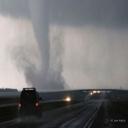Yahoo Answers is shutting down on May 4th, 2021 (Eastern Time) and beginning April 20th, 2021 (Eastern Time) the Yahoo Answers website will be in read-only mode. There will be no changes to other Yahoo properties or services, or your Yahoo account. You can find more information about the Yahoo Answers shutdown and how to download your data on this help page.
Trending News
When applying for a job at the NWS or the NSSL...?
Does it make a difference where I received my meteorology degree? Would the chances of getting a job increase if I got my degree at a more well known college rather than at a lesser known college, perhaps one that is not as accredited, even if my grades were the same and I fulfilled all other requirements?
5 Answers
- WaterLv 71 decade agoFavorite Answer
1ofSelby's and UALog answers are good. I hope I can contribute as much as they already have.
I was a selecting official for many years and have seen hundreds of applications for intern positions.
I never used where the degree was earned as a reason for selecting one applicant over another.
The main thing in getting the application on the selecting official's desk in the first place is to make sure you meet all the qualifications that are listed on the vacancy announcement. If you do not meet ALL of the qualifications by the closing date of the vacancy announcement, the selecting official will not even see your application. Personnel offices are very good at checking those who meet qualifications. I can remember only one application that made to my desk where I found they did not qualify.
The place where the meteorology degree is from is secondary to a long list things that the selecting official will be looking for. The main thing is to be honest. Any little discrepancy that is even perceived as being deceitful will likely land that application in the "thanks but no thanks" pile. I could tell you many stories on that.
Never fill in a question with "call me" type answers. It indicates that you either are hiding something or want to explain why something "bad" occurred. A selecting official will have many applications and seeing that type of answer on an application is almost an automatic invitation to the "not selected" pile.
Do not inflate your answers, keep them short, simple and to the point. Again, being honest goes a long way.
The selecting official will have a list of people that likely know you from school or where you were employed previously. They may even know your professor or instructors. If the applications are nearly equal in all respect to others, that official will dig and find out things to either tip the scale towards your application or away from it.
The bad news is this. It is rather unlikely you will go straight to a position at NSSL unless your work up to this point is well known and well documented. Nearly all positions are filled by people that have served several years in a forecast office as a minimum and shown good research potential by doing studies and papers.
Good luck, I have enjoyed many of your answers in this forum. .
Source(s): an old forecaster - UALogLv 71 decade ago
I have been a recruiter for over a decade and I will agree with Freight_Train, the college must be an accredited school. But the university you attend to get your degree is not a factor if you are applying for a government job straight out of college. Your application scores will not be higher if you went to a more well known school.
That being said, I will say that you should check out the university that you plan to apply to and see what it has to offer you. Many universities published a student survey that is done each year that gives a chance for the students to "grade" there instructors. See if you can get a copy of that if it is available to you. A good university program will help you adjust to your career in the operational forecasting profession.
Talk to any current students and Alumni, especially those that are now employed by the NWS or any other agency you may apply to. Those that have been out of the program for about five years will be more honest with there opinion. The main reasons are because they had time to seperate from the university program and have tried out what they have learned from school and applied it to the real forecasting world. I think you will be surprised by what they will tell you. Plus, they are well pass their job probational period.
Here are a few more tips that I feel are very important too. Try to get a intership, paid or unpaid. Not only will you learn about the good things and bad things about working for the agency, but you will make very valuable contacts. If you do extremely well in your internship, you can be offered a position even before you even apply or think you are ready to apply. But I only see less than 5 percent of the students getting in this way. And even if that does not occur in your case, your chances are much better getting in if you have your local NWS office Meteorologist-In-Charge or even the Regional Director going in to bat for you when you do finally do apply.
After your internship, stay in contact with the office staff.
Ask a lot of questions during our internship. We all know that even after college, you will still need to learn a lot more through experience.
Take care and best wishes to your future!
- 1 decade ago
I don't Think it would
As long as it is an acredited Collage or University and you recived your Bachelor's or higher degree in...
Meteorology,
Atmospheric Science, or
Hydrology (Physical Science or Engineering).
You should be ok.
After all they are Part of the Federal Government and can't be prejudice against collages and universities like Private industry can.
The Gov. usualy Hires based on merrit rather than where you went to School..
Only Opening at the NSSL is
Electronics Technician, ZT-856-III/IV CW-Non Status
http://jobsearch.usajobs.opm.gov/
Key Word search NOAA, NWS or NSSL
- 1ofSelby'sLv 61 decade ago
As with most professional job searches, your interview and the confidence you project will substitute for any preconceived differences between schools, particularly if you are applying for a position that requires only the BS. However if you are applying for an advanced position and if there are several candidates for this position, and everything else is equal the position will generally go to the one who graduated from a more recognized school, especially a school whose graduate programs specialized in the area you are applying for.
My personal philosophy is to obtain your BS from a small school which provides a higher professor to student ratio. Go on to a second and much larger school for the MS which offers a number of specializations. Finally, apply to the school with the recognized national and global specialists in the field of your choice for the Ph.D. This track eliminates what I call inbreeding and narrow scientific thinking by doing everything at one school. This approach seems also to be the most attractive to those who hire whether it be industry, NOAA, NASA, or consulting firms.
Source(s): I am a retired research meteorologist, Ph.D, with some 45+ years experience. - How do you think about the answers? You can sign in to vote the answer.
- Anonymous5 years ago
I cherished it. jogs my memory of the Jack interior the container commercial with the stressful "new guy" who keeps interrupting Jack. finally Jack gets on the intercom and says "Get the hot guy..." he interrupts and says "a nook place of work" and Jack says "a severance kit." LOL That one relatively cracks me up!







